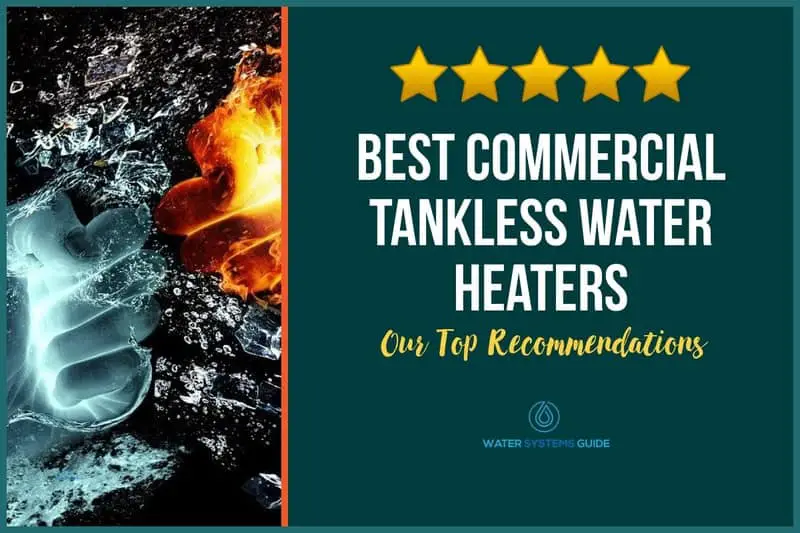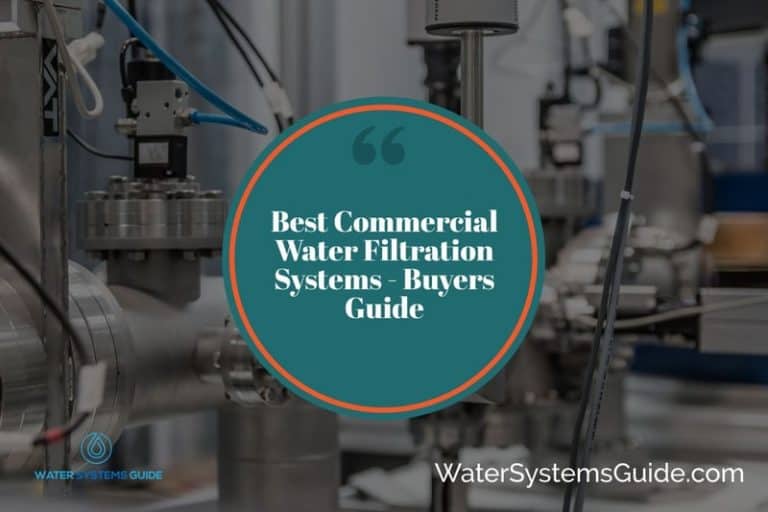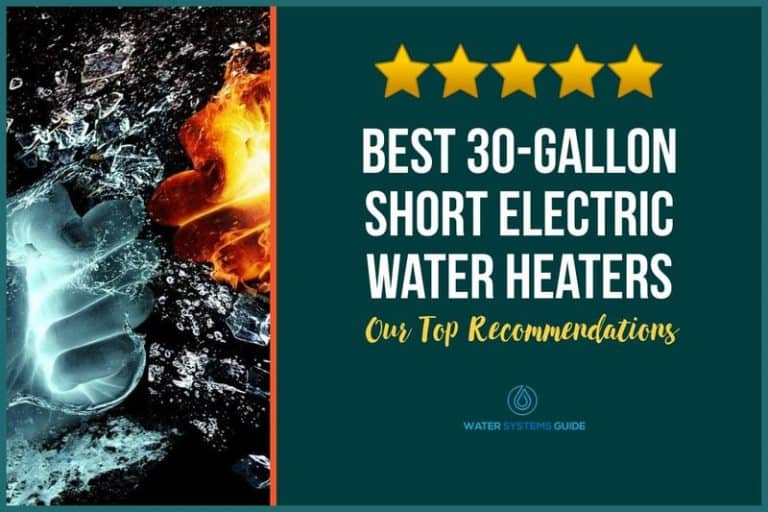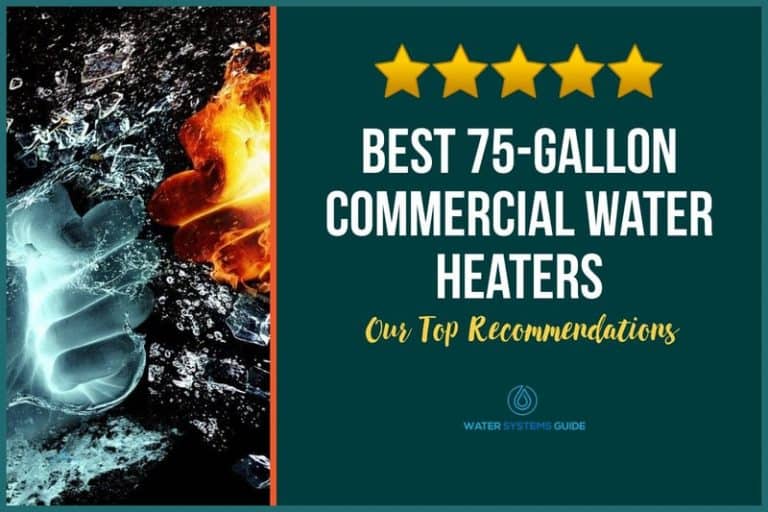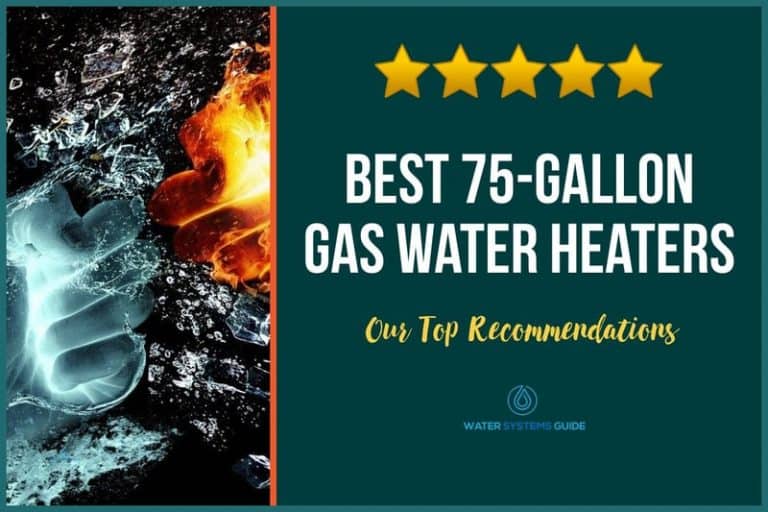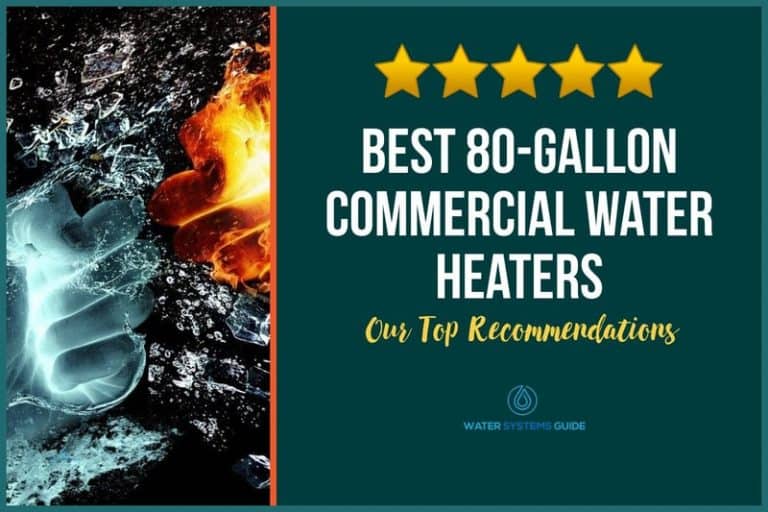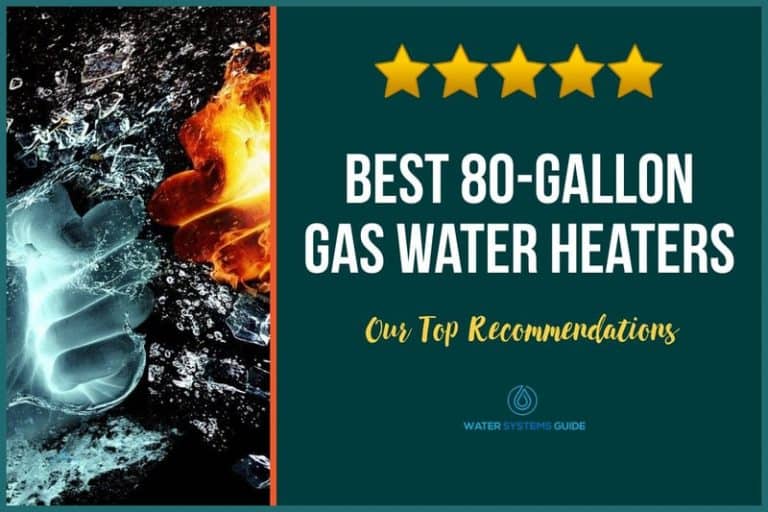Top 12 Best Commercial Tankless Water Heaters (January 2026)🥇
Last Updated: 28 January 2026
In this article, we’re going to be discussing the best commercial tankless water heaters available.
✅Why use a commercial tankless water heater?
According to a study carried out by Consumer Reports, commercial tankless water heaters, including electric and gas units are an energy-efficient way of getting hot water. Their ability to process large amounts of water without storing it allows these models to consume 22% less energy than tank-carrying water heaters.
Their space-saving design is another notable feature of tankless heaters. Since they don’t have to use tanks to store water, these products can afford to be small and compact. That’s precisely the reason why you can install them in tight spaces with minimal fuss.
On top of everything else, these units justify their high initial asking price by delivering a constant supply of hot water. When a hot water tap is opened, an electric element or gas burner heats the water as it travels through the pipe. That means you won’t have to wait to get hot water at the tap.
💧Top Considerations Before Purchasing
- Technical Specs – We’ve done our very best to outline each heater’s technical specs, including thermal efficiency, flow rate (GPM), energy factor and temperature range, so you have all of this information available when making any comparisons between models.
- General Specs – We’ve also included information regarding the units physical dimensions and weight
- Price – Price information has also been specified, with $ representing the lowest price and $$$$$ representing the highest. We realize that everyone has a unique budget, so this is an important consideration.
- Warranty – We’ve displayed warranty information where possible.
- Customer Reviews/Ratings – We’ve gone about researching only the highest quality tankless water heaters to include within this article, therefore you can be confident in knowing that any of these units are a great choice.
Best Commercial Tankless Water Heaters Review -Top 12
Electric
- Stiebel Eltron 2400W Commercial Electric Tankless Water Heater – 3GPM – $$ – Skip to Product
- Stiebel Eltron 224201 240V, 7.2/9.6kW – 0.26GPM – $$ – Skip to Product [Budget Electric Recommendation]
- Stiebel Eltron Tankless Water Heater Tempra 36 Trend – 5GPM – $$$ – Skip to Product [Top Electric Recommendation]
- Stiebel Eltron Tankless Water Heater Tempra 36 Plus – 3GPM – $$$ – Skip to Product [Top Electric Recommendation]
- Eemax ED024480T2T Electric Tankless Water Heater – 4GPM – $$$$ – Skip to Product
Gas (Indoor Installation Only)
- Rinnai RUCS75iN Natural Gas Tankless Hot Water Heater – 5GPM – $$$$ – Skip to Product
- Rinnai RUCS75iP Propane Tankless Hot Water Heater – 7GPM – $$$$ – Skip to Product
- AO Smith ATI-540H-N Condensing Residential/Light Commercial Tankless Heater – 10GPM – $$$$ – Skip to Product
Gas (Ourdoor Installation Only)
- Rinnai V Series V94EN HE Tankless Hot Water Heater – 4GPM – $$$$ – Skip to Product
- Rinnai V Series V94EP HE Tankless Hot Water Heater – 8GPM – $$$$ – Skip to Product
- Rinnai RL94EP Tankless Water Heater – 4GPM – $$$$ – Skip to Product
- Rinnai RL94EN Tankless Water Heater – GPM – $$$$ – Skip to Product
Commercial Electric Tankless Water Heaters – Top 5
We’ve included a selection of the best commercial electric tankless water heaters.
Stiebel Eltron 2400W Commercial Electric Tankless Water Heater
The Stiebel Eltron 2400W Electric Tankless Water Heater is designed to meet the hot water requirements of small-to-medium business enterprises. It also comes from a reputed manufacturer, has a respectable warranty period and has the premium construction to last for years with proper maintenance.
Technical Specs
- Thermal Efficiency: 99%
- Flow Rate (GPM): 3GPM @ 33*F
- Energy Factor: N/A
- Temperature Range: 82 to 130*F
General Specs
- Price: $$
- Dimensions: 16 x 5.2 x 17.5 inches
- Weight: 1 pounds
- Warranty: 6 years on heat exchanger/leaks
Features
One of the unique selling points of this water heater is its electronically-activated and temperature-controlled operation. It calculates the amount of energy needed to meet your hot water requirements. This allows this unit to consume only as much power as required and weigh less on your electricity bills.
One can see by looking at its body that this heater comes with a rocker switch. You can use it to adjust the temperature in increments of 1* Fahrenheit. What you cannot see, meanwhile, are the four over-temperature protections built-inside this model. They ensure that it keeps going for longer.
The water that flows through the heater’s pipe does so through uniquely designed pipes. They have the necessary construction to relieve air build-up and prevent pressure from increasing inside the pipes. You can thus rest assured that there won’t be any danger of the pipes blowing up.
Pros
- Meets ANSI/UL Standard
- Certified to CAN CSA
- Built-in over-temperature protection
Cons
- Smaller flow rate
Stiebel Eltron 224201 240V, 7.2/9.6kW
Budget Electric Recommendation
Are you looking for a compact tankless water heater? Hoping to get your hands on a slim model that could outperform the bulky ones? Then the Stiebel Eltron 224201 240V might be the one for you. It is one of those unique models which punch above their budget asking price by offering high-end features.
Technical Specs
- Thermal Efficiency: 99%
- Flow Rate (GPM): 0.264 (activation)
- Energy Factor: 98
- Temperature Range: 86 to 140*F
General Specs
- Price: $$
- Dimensions: 125 x 14.1875 x 4.125
- Weight: 9 pounds
- Warranty: 7-year on heating modules
Features
Its weight and flow-rate rating make it clear that this model is meant to be employed as a point-of-use system. It isn’t one of those units that could supply hot water to the whole business. You’d have to install various models of this system at multiple faucets if your hot water requirements are huge.
Provided you have no issues about that point, you might admire the multiple features that have made this heater endearing to its users. Foremost among them is its temperature control knob. Its location on the front cover lets you easily adjust the temperature of the water coming out of the unit.
Equally admirable is the self-modulating feature of this unit. It takes help from the built-in temperature sensor to automatically adjust the water output. Also on offer is a flow-adjustment valve that lets you limit/increase the flow of the water.
Pros
- Has two temperature sensors
- One flow sensor
- Switchable via a jumper
Cons
- Low flow rate
Stiebel Eltron Tankless Water Heater Tempra 36 Trend
Top Electric Recommendation
Those of you with large businesses that have substantial hot water needs might not be impressed with what you have seen from the previous two models. That is why we have come up with the Tempra 36 Trend whose tremendous flow rate and premium construction will convince you to pay big bucks.
Technical Specs
- Thermal Efficiency: 99%
- Flow Rate (GPM): 5 GPM at 41*F
- Energy Factor: 99
- Temperature Range: 86 to 140*F
General Specs
- Price: $$$
- Dimensions: 63 x 16.63 x 14.50 inches
- Weight: 1 pound
- Warranty: 7-year leakage and 3-year parts
Features
One of the main reasons why models belonging to the Tempra series are making the waves in the market is their exclusive Electronic Temperature Control. It makes sure that even when your water requirements are varying, the output temperature of the water remains steady.
The exclusive design of this model keeps dry firing at bay and it also boasts an electronic switch for a virtually silent operation. Its copper sheathed heating element is protected with a copper cylinder that protects it from suffering any wear and tear.
Ease of installation is one more area where this model rocks the boat. You can join it to your home’s water supply with the standard ¾’’ NPT connections. There’s no compulsion on you to use T & P valve as this heater operates without one. You might also find it good to know that it has seismic proof construction.
Pros
- Silent operation
- Digital temperature display
- Auto-modulation operation
Cons
- Problems during installation if you’re upgrading
Stiebel Eltron Tankless Water Heater Tempra 36 Plus
Top Electric Recommendation
Those of you with large businesses that have huge hot water needs might not be impressed with what you have seen from the previous two models. That is why we have come up with the Tempra 36 Trend whose huge flow rate and premium construction will convince you to pay big bucks.
Technical Specs
- Thermal Efficiency: 99%
- Flow Rate (GPM): 3 GPM at 61*F
- Energy Factor: 99
- Temperature Range: 86 to 140*F
General Specs
- Price: $$$
- Dimensions: 63 x 16.63 x 14.5 inches
- Weight: 1 pound
- Warranty: 7-year leakage and 3-year parts
Features
Juxtapose the specifications of this model with the previous one, and you’d come to see that both of them are the same barring one or two things. That would obviously lead you to believe that there isn’t much that sets apart this duo. Such thoughts are misguided.
There are many differences between the Tempra 36 and Tempra 36 Plus. The former doesn’t have the advanced flow control, which automatically limits the flow rate of hot water when the user attempts to draw more water than what the unit can adequately heat.
Aside from that, the Tempra 36 Plus has two temperature preset buttons and a flow rate monitor. It also has an energy monitor that shows you the cost savings that you enjoy by using this model. All these three are features that you don’t get with the Tempra Trend series.
Pros
- Dynamic advanced flow control
- Energy and flow rate monitor
- Temperature preset buttons
Cons
- Premium-price
Eemax ED024480T2T Electric Tankless Water Heater
Mainly because it has hit the market only in the past few months, the Eemax tankless water heater cannot compete with those above in terms of reputation. However, it can very well stand up to all those models in terms of features, flow rate and shelf life. Go for it if you aren’t brand conscious.
Technical Specs
- Thermal Efficiency: 99%
- Flow Rate (GPM): 4
- Energy Factor: 99
- Temperature Range: 100 to 140*F
General Specs
- Price: $$$$
- Dimensions: 15 x 13 x 5 inches
- Weight: 42 pounds
- Warranty: 5-year leakage and 1-year parts
Features
Unlike most heavy-duty tankless water heaters that you see on the market, this one is a cinch to install. It doesn’t use its huge 4 GPM flow-rate as an excuse to force you to hire a plumber for its setup. You don’t have to solder its fittings and can mount it directly to your wall with standard hardware.
Eemax has equipped this model with a flow switch to cut down on standby heat loss. This component reduces the heater’s electricity consumption by activating its heating element only when you’re drawing water. That means that the unit won’t consume electricity when sitting idly.
Its 99% energy efficiency and 0.99 energy factor of this model should convince you that this model won’t weigh heavily on your monthly energy bills. Throw into the mix its steel construction and no-delay water delivery, and this heater does enough to justify its astronomical price tag.
Pros
- Easy to install
- Glass-reinforced heating chambers
- Flow switch minimizes heat loss
Cons
- High price
Commercial Gas Tankless Water Heaters – Top 7
Here are the best seven commercial gas tankless water heaters currently available on the market:
Rinnai RUCS75iN Natural Gas Tankless Hot Water Heater
The Rinnai RUCS75iN Series SE tankless water heater is made for indoor installation only. It works best in a warm climate and in an area that is shielded from bad elements of weather. You can count on it to deliver the goods as long as it isn’t freezing out there.
Technical Specs
- BTU: 10,3000 – 160,000
- Thermal Efficiency: 99%
- Flow Rate (GPM): 5 GPM
- Energy Factor: 93
- Installation: Indoor Only
General Specs
- Price: $$$$
- Dimensions: 1 (D) x 31.1 (H) x 18.5 (W) inches
- Weight: 3 pounds
- Warranty: 12 year/5 year/1 year
Features
There are some models on the market whose unique selling point is their extreme efficiency. The RUCS75iN isn’t one of them. This unit’s huge flow-rate of 7.5 GPM is as impressive as its 0.93 energy factor. That means it delivers impressive money savings while also providing bucket-loads of hot water.
It is equipped with ThermaCirc360 technology that keeps on recirculating hot water through the pipes. This makes sure that you get the water the moment you open the tap. There won’t be any waiting time during which you have to do nothing but stare at the tap.
That this model has a compact design means you can install it in non-traditional spaces. It would quickly get under your attic, in the crawl space and even inside the closet. Also on offer is a compatible mobile app using which you can schedule timers and put the system into vacation mode.
Pros
- Huge flow rate
- 12 year residential/factory warranty
- Compatible with a mobile app
Cons
- Vent kit has to be purchased separately
Rinnai RUCS75iP Propane Tankless Hot Water Heater
Posing yourself as an alternative to one of the best-selling tankless water heaters is one thing. Justifying that claim is an altogether different ball game. That’s precisely what the iSpring RCB3P water filter system does. Though you’d have to pay over the odds to take advantage of what it has to offer.
Technical Specs
- BTU: 10,300 – 160,000
- Thermal Efficiency: 93%
- Flow Rate (GPM): 7 GPM
- Energy Factor: 90
- Installation: Indoor Only
General Specs
- Price: $$$$
- Dimensions: 1 (D) x 31.1 (H) x 18.5 (W) inches
- Weight: 3 pounds
- Warranty: 12 year/5 year/1 year
Features
Wondering what is it that separates this model from the abovementioned Rinnai? Multiple features set apart the duo. This one runs on propane gas and is therefore recommended for those of you who live in far-flung areas where the supply of natural gas is impossible.
However, that doesn’t mean that you should ignore this model if you have a natural gas line coming to your home. That decision will deprive you of the extra 0.2 gallons per minute of hot water that this unit provides (7.7 GPM) vis-à-vis the RUCS75iN water heater.
Similar to its low-capacity counterpart, you can operate this model as well with a Control-R 2.0 mobile app. It features timers and schedules to help you pre-program this unit in advance. You can also activate a ‘vacation mode’ using the app that will put the heater to sleep.
Pros
- Endless supply of hot water
- Cinch to install
- Slim and compact
Cons
- Runs on propane
AO Smith ATI-540H-N Condensing Residential/Light Commercial Tankless Heater
Most tankless heaters you see on the market pay extra attention to their flow rate and efficiency. Some care about secondary things like ease of installation and all that. The AO Smith ATI-540H-N belongs to the minority that places equal emphasis on both.
Technical Specs
- BTU: 10,300 – 199,000
- Thermal Efficiency: 93%
- Flow Rate (GPM): 10 GPM
- Energy Factor: 95
- Installation: Indoor Only
General Specs
- Price: $$$$
- Dimensions: 5 x 18.5 x 29.5 inches
- Weight: 59 pound
- Warranty: 12 year/5 year/5 year
Features
Those of you who thought that its anonymous brand name would force this heater to come cheap are wrong. It is charging for its features and not the name on the package. Some of those features, like the overheat cutoff fuse, are what we come to expect from models costing this much.
Others, like the air-fuel ratio sensor that ensures optimum combustion and minimizes wastage of energy, are unexpected. Similar is the case with its exhaust safety valve that prevents the build-up of gases and the water temperature safety control that minimizes the chance of bursting of pipes.
Its flow rate of 10 gallons per minute is at least 2.5 GPM more than offered by any heater that we have seen thus far. Equally unprecedented is the 5-year warranty that this model gives on parts – as most heaters which cost this much lure their users with a lower, 3-year warranty.
Pros
- Air-fuel ratio sensor
- Overheat cutoff fuse
- Massive flow rate
Cons
- Have to wait for hot water
Outdoor Installation Only
Rinnai V Series V94EN HE Tankless Hot Water Heater
One of the reasons why Rinnai is the most trusted brand in the tankless water heater market is its ability to produce high-quality indoor and outdoor heaters. This water heater is a proof of this statement as it has the construction to withstand everything Mother Nature can throw at it.
Technical Specs
- BTU: 10,3000 – 160,000
- Thermal Efficiency: 81%
- Flow Rate (GPM): 4 GPM
- Energy Factor: 81
- Installation: Outdoor Only
General Specs
- Price: $$$$
- Dimensions: 6 (D) x 24.3 (H) x 14.04 (W) inches
- Weight: 3 pounds
- Warranty: 10 year/5 year/1 year
Features
The Rinnai V Series HE Tankless hot water heater is designed for medium-to-large size enterprises. It offers a flow-rate of 9.4 GPM and lets you control its operation with a mobile app. You can use the application to schedule the heater’s operation, pre-program it and put it to sleep.
Some of you might not like this model using propane as its fuel. It is likely that others, particularly those that don’t have the facility of live natural gas, won’t care much about it. They would perhaps also appreciate the 120 months warranty that this model provides on its heat exchanger.
Pros
- 4 GPM flow rate
- Highly efficient
- 60 months parts warranty
Cons
- Not easy to install
Rinnai V Series V94EP HE Tankless Hot Water Heater
The fact that this hot water heater comes from as famous a brand as Rinnai comes across as a double-edged sword. On the one end, it means you would hear many people recommending it. On the other, its fame has allowed this heater’s manufacturer to inflate this model’s asking price.
Technical Specs
- BTU: 10,3000 – 199,000
- Thermal Efficiency: 82%
- Flow Rate (GPM): 8 GPM
- Energy Factor: 82
- Installation: Outdoor Only
General Specs
- Price: $$$$
- Dimensions: 6 (D) x 24.3 (H) x 14.04 (W) inches
- Weight: 3 pounds
- Warranty: 10 year/5 year/1 year
Features
Since both of them belong to the same V series, a comparison will inevitably arise between the V94EP and the V94EN that we reviewed above. This model scores a point on one count as its 9.4 GPM flow rate is at least 0.4GPM more than what is offered by its counterpart.
Aside from this subtle (but significant difference), you won’t notice both these models differing on many other counters. Both operate on the same fuel (propane gas), have exactly the same dimensions, and boast almost the same energy efficiency. So this model deserves your attention if you want extra water.
Pros
- 8 GPM flow rate
- 12 months’ labor warranty
- Can be used anywhere
Cons
- Unclear instructions
Rinnai RL94EP Tankless Water Heater
The Rinnai RL94EP is by far the most expensive tankless water heater on this review. Its price tag is so high that you could get two models of some of the electric tankless water heaters in this article at the price of one RL94EP. So does it justify its inflated asking price? Let’s find out.
Technical Specs
- BTU: 10,3000 – 199,000
- Thermal Efficiency: 82%
- Flow Rate (GPM): 4 GPM
- Energy Factor: 82
- Installation: Outdoor Only
General Specs
- Price: $$$$
- Dimensions: 6 (D) x 24.3 (H) x 14.04 (W) inches
- Weight: 3 pounds
- Warranty: 12 year/5 year/1 year
Features
One specific feature of this model that almost justified its astronomical asking price is its usage of Circ-Logic technology. This mode gives you the option to set the heater’s water recirculation patterns as per your habits. That ensures that you get hot water when you need it.
Aside from that, its usage of propane as heating fuel means you can as easily use this unit in the middle of a city as you could in a jungle. All you have to do is to carry a large-capacity propane tank that could allow this model to provide its maximum flow rate of 9.4 gallons per minute.
Pros
- Circ-Logic technology
- Up to 9.4 GPM flow rate
- Wi-Fi control
Cons
- Pricey
Rinnai RL94EN Tankless Water Heater
Is there anything different between this model and the one we reviewed immediately before it? Or are both of them the same with minor changes? To find out the answer to these questions, let’s review the Rinnai RL94EN tankless water heater
Technical Specs
- BTU: 10,3000 – 199,000
- Thermal Efficiency: 82%
- Flow Rate (GPM): 4 GPM
- Energy Factor: 82
- Installation: Outdoor Only
General Specs
- Price: $$$$
- Dimensions: 6 (D) x 24.3 (H) x 14.04 (W) inches
- Weight: 3 pounds
- Warranty: 12 year/5 year/1 year
Features
One count on which the RL94EN and RL94EP differs is visible from their name. The model we’re reviewing now operates on natural gas and is therefore recommended in city areas or other abodes where this facility is available. The RL94EP, meanwhile, relies on propane to heat water.
Apart from that major difference, there is not much to separate the two. Both are recommended for outdoor installation, are equipped with Circ-Logic technology, and boast a 9.4 GPM flow rate. The duo is also similar in its energy savings as both the heaters consume 40% less energy than tank heaters.
Pros
- Circ-Logic technology
- Up to 9.4 GPM flow rate
- Wi-Fi control
Cons
- Requires minimum flow rate of water to operate
Frequently Asked Questions
Here are some of the FAQs related to commercial tankless water heaters:
🚰What is a commercial tankless water heater?
Commercial tankless water heaters heat only as much water as needed, when it is needed. They heat water on demand and use 24 to 34% less energy than traditional water heaters. They are made for applications whose consumption of hot water is more than that of residential use.
You can count on these units to provide as much as 15.2 liters of hot water per minute. Most of them come with a warranty of more than 20 years. Their shelf-life can be further extended due to these heaters having replaceable parts, which you can easily exchange when they go bad.
💧What are the benefits of tankless commercial water heaters?
Following are the major benefits of using a tankless commercial water heater on your premises:
1. Energy Efficiency
An estimate by the US Department of Energy explains how energy-efficient tankless water heaters are vis-à-vis their traditional tank-carrying counterparts.
Provided you have a small business that needs less than 41 gallons of hot water daily, a tankless commercial water heater will be 24% – 34% more energy-efficient than a conventional heater.
Even if your hot water requirements are enormous – up to 86 gallons per day – these units will still be 8% to 14% more energy efficient than their tank-carrying colleagues.
2. Lower Utility bills
As we have already proved it beyond doubt that these units use less energy, you shouldn’t have any trouble believing the fact that these units can also lower your utility bills.
Energy Star estimates that tankless water heaters bearing its certification can save a household of four over $1800 over its lifetime, compared with any conventional tank-type heater.
The beneficial impact of these heaters isn’t related to household applications. That’s why the market of commercial tankless heaters is projected to grow at a rate of 7.5% per annum between 2019 and 2025.
3. Extended lifespan
The absence of the tank not only empowers these units to deliver hot water on demand. It also enables them to last longer than tank-carrying water heaters.
Various estimates claim that with provided you maintain it regularly, you can count on your tankless heater to last five years longer than the tank water heater.
Provided you look after your model more carefully, it will outlast a similar-capacity tank-carrying model by over 10 years, with the overall shelf-life of tankless heaters rated at up to 20 years.
4. Endless hot water
Do you know why the majority of their users refer to tankless water heaters as on-demand units? That’s because they deliver as much water as needed, when it is needed.
These units never run out of water because the water supply of your entire unit is the heater’s water supply. They don’t have any specific tank which they have to tap into to get their water.
As a result, with their built-in heating elements heating cold water as it passes through the pipes (and before it reaches your tap), you’ll get a constant supply of hot water.
5. Space-saving design
Traditional tank-carrying heaters hold up to 60 gallons of water and therefore measure about 24 inches wide and 60 inches tall. That is the space they will consume in your premises.
In contrast, even the biggest capacity tankless water heaters measure 28 inches tall and 20 inches wide. This allows them to take up far less space in your indoors.
🚰How to choose the right industrial tankless water heater?
Here’s how you can choose the right commercial tankless water heater for your needs:
Select the right size
Calculate these two measurements to select the right size tankless water heater:
- Flow rate of hot water consuming devices: Estimate the number of devices that will consume hot water. Calculate their combined flow rate by adding the individual flow rate of each device. This is the minimal flow rate you’d need from your heater.
- Temperature difference (^T): Determine how much temperature of the cold water the heater will have to raise. You can calculate it by subtracting the temperature of incoming cold water (using this map) and the desired temperature.
Once you have both these measurements at your disposal, put them in this extremely helpful calculator from Rheem to select which size unit will be able to meet your hot water needs.
Choose Energy Star® heater
Regardless of whether you intend to purchase an electric or gas tankless water heater, make sure it comes with Energy Star certification. Gas tankless heaters bearing the Energy Star logo employ more efficient heat exchangers and use 15 percent less energy than other commercial units.
Electric units with the Energy Star logo, meanwhile, use a refrigerant-based system to transfer ambient heat to the water. This allows them to use less than half of the energy that other electric-powered tankless units consume to raise the temperature of water.
Select the right drain valve
Most of you might not be aware of the fact that it’s crucial for the performance of the heater that you flush it regularly. Constant draining helps prevent the build-up of sediments in the pipes and maintain the quantity of the water heated. It also increases the lifespan of the system.
Drain valves are mostly made of three materials: plastic, composite, and brass. Plastic is undoubtedly the cheapest of the three but it is also the least trustworthy. Brass deserves your attention if you want a valve that can last longer, handle higher temperatures as well as flow rates of up to 100 gallons.
Choose higher Energy Factor
Energy Factor is a fancy term used to describe the heater’s energy efficiency. It is calculated by estimating the amount of energy the heater uses to heat water and dividing it with the total amount of energy that powers the unit.
That means that the higher the energy factor, the more efficient will be your tankless water heater. Most gas tankless models that you see on the market have their energy factor between 0.5 and 0.9. The best electric tankless heaters, meanwhile, have an energy factor of 0.99.
Pro Tip: Even though electric heaters have a higher energy factor than gas-powered models, electricity costs three times as much as natural gas in the US. So you need to keep both factors in mind (Energy Factor and Cost of Fuel) before deciding in favor of either of these units.
Select a wider temperature range
The wider the temperature range of a heater, the more easily it will cater to different applications. You can understand this point by determining the purpose for which you use different hot water faucets in your commercial applications.
While the one that is used to supply water for making coffee needs to receive water at a much higher temperature, the other that only supplies water to the washing machine can make do with slightly lukewarm water. It’s therefore recommended that you get a heater with a wider temperature range.
💧What are the different types available?
Most of you might already know that tankless water heaters are available in two types: electric- and gas-powered. Both of them have their pros and cons which make them suitable for a certain audience and unfit for others.
That’s why in this section we’re going to compare electric and gas tankless heaters on various factors. We’re also going to shed light on the various types of gas-powered models. So you could make an informed decision as to which of them will best fit your requirements.
Cost
There are two costs which you need to consider when shopping heaters:
- Capital or Up-front cost: Electric tankless water heaters cost less upfront than their gas-powered counterparts. While you can get them between $500 and $700, you might have to fork out more than $1000 to purchase a heavy-duty gas tankless heater.
- Running cost: The lower up-front cost of electric heaters isn’t due to their poor design or because they employ a cheap material of construction. They are as sturdy as gas models. Instead, it’s the low running cost of gas-powered heaters that raises their upfront cost.
Ease of installation
Electricity-powered tankless heaters are easy to install. Here’s why:
- Electric Tankless Heaters: Installing these models is a cinch. All you need to do to get them up and running is to install their one end to your home’s water supply line, the other end to the pipe that takes water from the heater to your appliances and hook them with a power connection.
- Gas Tankless Heaters: Here’s why gas-powered models are difficult to install. Aside from giving them all the connections that we mentioned in the previous paragraph, you’ve to provide these heaters with a fresh air supply, a fitting gas line size, and a venting option.
Type
Unlike their one-type-fits-all electric colleagues, gas heaters are available in two types:
- Propane Tankless Heaters: Since natural gas isn’t offered in all areas, propane heaters are a better option for those of you living in far-flung areas. Other than that, there is no tangible benefit of propane heaters vis-à-vis their natural gas cousins.
- Natural Gas Tankless Heaters: Natural gas is a cheaper alternative to propane, is safe to use (as it’s lighter than propane and dissipates in the air more readily in the case of leakage), and don’t require you to store a gas cylinder.
Hot water delivery
Gas-powered models rule the roost in this case. Here’s why:
- Electric Tankless Heaters: Due to the bottlenecks in their design, even the best electric tankless water heaters won’t be able to deliver more than 8GPM of water. That limits their utility to small and medium-sized commercial applications.
- Gas Tankless Heaters: Provided you are supplying them with natural gas (or have a huge propane cylinder connected to them), gas tankless heaters will pay back by supplying over 10 GPM of hot water. That’s why they are best suited for a large-size business enterprise.
Maintenance requirements
Gas-powered models require more maintenance. Here’s why:
- Electric Tankless Heaters: These models come with a pre-filter that prevents sedimentation, an inlet filter and a valve using which you should flush the entire unit annually. Only these three parts require major maintenance, and that too only once or twice a year.
- Gas Tankless Heaters: Their complex construction makes these models hard to maintain. You’ll have to pay a licensed technician to check they are combusting fuel safely and the vent is performing as intended. Their heat exchange also needs service on a regular basis.
Ease of troubleshooting
Electricity-powered models require more maintenance. Here’s why:
- Electric Tankless Heaters: Provided something goes awry with these models, it would be easy for the homeowner to use the display panel to troubleshoot, diagnose, and repair the problem. These units are more eco-friendly as well.
- Gas Tankless Heaters: Since they have a complex heat exchanger, gas-powered models can be difficult to get back to action if they start misbehaving. You’ll have to pay a licensed plumber to get them back up and running.
Final Verdict – Electric or Gas?
Both of them are intended to serve a different set of audiences. Here’s how:
- Commercial Electric Tankless Water Heaters: Go for these heaters if you can’t afford to pay more upfront, want a heater that is safer to use indoors, has a lower carbon footprint, and can be easy to repair when the problems arise.
- Commercial Gas Tankless Water Heaters: Go for these heaters if you prefer a lean gas bill at the end of the month, do not care about the environment, and have the temperament (as well as the budget) to hire a technician to install them once and repair or maintain them frequently.
Conclusion
All the models recommended above are the ones that are trusted by hundreds like you. You can use our review and the subsequent buying guide to select one that meets your requirements. As your needs are one area that we cannot define for you.
Still, if you want us to, we recommend the Rinnai RL94EP Gas Tankless Water Heater for those of you whose hot water requirements are huge. It delivers a huge flow rate of 9.8 GPM and comes with a respectable heat exchanger warranty of 12 years.
Provided you are after an electric tankless water heater, the Stiebel Eltron Tankless Water Heater Tempra 36 Trend is worthy of your attention. It boasts an excellent 99% efficiency and has a respectable 4.5 GPM for an electric heater.






